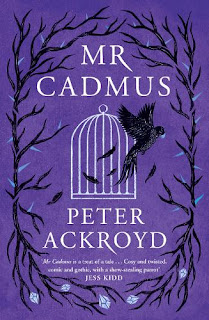Mr Cadmus - Peter Ackroyd
Mr Cadmus starts out like a comedy of smalltown English manners, introducing us to Maud Finch and Millicent Swallow, two single middle-aged ladies who occupy the outer edges of a row of the three cottages in The Coppice in the village of Little Camborne. The middle house between them has been vacant since the death of the previous owner who they didn’t really approve of, but there is some trepidation about the prospective new owner of the cottage. The ladies aren’t quite sure what to make of Theodore Cadmus, a foreigner from a small Mediterranean island, but he is certainly intriguing, bringing plenty to ponder and discuss between each other and more widely with the rest of the village.
Far from quiet harmless maiden ladies in a country village, the backstory of Maud and Millicent is revealed to have a rather more sinister edge and they have something of a history together. Both are related as cousins, both were nurses during the war, and both have implicated in or have been actual agents of murders that were never explored due to the circumstances and the war. Ackroyd curiously makes this seem just like a quirk of character, skimming over any deeper psychological or behavioural insights, which could be intentional, giving the story a darker character that sits a little uneasily with the breezy descriptions.
The sleepy little community of Little Cambourne is certainly not without incident now that Theodore Cadmus has arrived. It’s not just that he comes with a parrot that swears like a trooper since it got out of quarantine, but the beast of Barnstaple has been attacking young women and the villagers are shocked to hear of an armed hold up in the post office. As we learn more about Mr Cadmus however, it appears that his arrival in the village is not by chance but that he may also have a story related to the war years that has brought him over to England with a certain purpose in mind.
You can it for granted then that the arrival of a foreigner into a very straight-laced community of vicars and village fetes is going to involve eccentricity and differences. It certainly gets very strange indeed, but the writing never seems to be able to draw anything deeper out of this. Certain intriguing elements, characteristics and themes stand out, but they never feel as if they are developed into anything meaningful. To a large extent however the characters are defined by experiences during the war, and these experiences mix uneasily with religion, paganism and superstition.
Mr Cadmus however never really feels like it settles down in any one idea of tone, whether funny, satirical, dark or sinister, which doesn’t necessarily have to be a problem, but it never acquires any depth or consistency. It feels rather as if Ackroyd himself stopped having belief himself in his characters and story as it spins further away from reality into the realms of the mythology, Cadmus being the founder of Thebes in Greek mythology. It just adds another layer onto a strange story that lacks consistency and whose purpose and meaning remains elusive.




Comments
Post a Comment